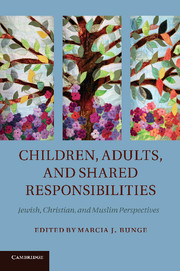Book contents
- Frontmatter
- Contents
- List of Contributors
- Acknowledgments
- Introduction
- PART I RELIGIOUS UNDERSTANDINGS OF CHILDREN
- PART II RESPONSIBILITIES OF CHILDREN AND ADULTS
- Chapter 9 Work, labor, and chores
- Chapter 10 Honor your father and your mother
- Chapter 11 Will I have Jewish grandchildren?
- Chapter 12 Linking past and present
- Chapter 13 Orphans and adoption
- Chapter 14 Second-hand children
- Chapter 15 Christianity's mixed contributions to children's rights
- Chapter 16 Children's rights in modern Islamic and international law
- Select bibliography
- Index of names
- Index of subjects
- References
Chapter 16 - Children's rights in modern Islamic and international law
Changes in Muslim moral imaginaries
from PART II - RESPONSIBILITIES OF CHILDREN AND ADULTS
Published online by Cambridge University Press: 05 October 2012
- Frontmatter
- Contents
- List of Contributors
- Acknowledgments
- Introduction
- PART I RELIGIOUS UNDERSTANDINGS OF CHILDREN
- PART II RESPONSIBILITIES OF CHILDREN AND ADULTS
- Chapter 9 Work, labor, and chores
- Chapter 10 Honor your father and your mother
- Chapter 11 Will I have Jewish grandchildren?
- Chapter 12 Linking past and present
- Chapter 13 Orphans and adoption
- Chapter 14 Second-hand children
- Chapter 15 Christianity's mixed contributions to children's rights
- Chapter 16 Children's rights in modern Islamic and international law
- Select bibliography
- Index of names
- Index of subjects
- References
Summary
The reception of secular rights narratives in Muslim ethical and juridical discourses has generated multiple perspectives. This diversity has, in part, to do with the multiple political perspectives espoused by different individual and collectivities of Muslims, as is the case with all other groups, and thus it is almost impossible to define the Islamic position. On a global level, a particular kind of liberal sensibility often frames cultural and family rights debates. Periodically these discourses elicit unfavorable responses from cultures that eschew such liberal sensibilities. In those instances, advocates express a preference for embracing more substantive value commitments such as modesty, decency, respect, honor, duty, and moral formation within a religious discourse, while placing the liberty of an individual to make autonomous choices lower down the list of priorities.
Whereas most Muslim human rights advocacy groups find elective affinity with a broad range of liberal rights of the child, occasionally among Muslim advocates there is some disagreement with or resistance to the value commitments of liberal discourses. And some Muslim advocates, perhaps a minority, totally reject secular international charters on the rights of the child as superfluous and theologically offensive. These opponents allege that the international charters of rights lack the fundamental theocentric value commitments required by their interpretation of Islam and that liberal rights only advance unbridled freedoms that border on hedonism.
- Type
- Chapter
- Information
- Children, Adults, and Shared ResponsibilitiesJewish, Christian and Muslim Perspectives, pp. 292 - 308Publisher: Cambridge University PressPrint publication year: 2012
References
- 1
- Cited by



